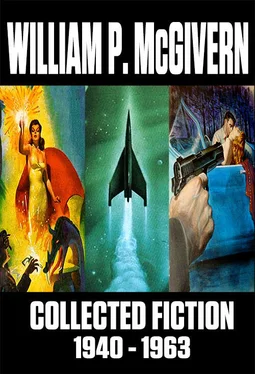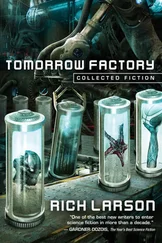Уильям Макгиверн - Collected Fiction - 1940-1963
Здесь есть возможность читать онлайн «Уильям Макгиверн - Collected Fiction - 1940-1963» весь текст электронной книги совершенно бесплатно (целиком полную версию без сокращений). В некоторых случаях можно слушать аудио, скачать через торрент в формате fb2 и присутствует краткое содержание. Год выпуска: 2014, Издательство: Jerry eBooks, Жанр: Ужасы и Мистика, Фантастика и фэнтези, Детектив, Прочие приключения, на английском языке. Описание произведения, (предисловие) а так же отзывы посетителей доступны на портале библиотеки ЛибКат.
- Название:Collected Fiction: 1940-1963
- Автор:
- Издательство:Jerry eBooks
- Жанр:
- Год:2014
- ISBN:нет данных
- Рейтинг книги:3 / 5. Голосов: 1
-
Избранное:Добавить в избранное
- Отзывы:
-
Ваша оценка:
- 60
- 1
- 2
- 3
- 4
- 5
Collected Fiction: 1940-1963: краткое содержание, описание и аннотация
Предлагаем к чтению аннотацию, описание, краткое содержание или предисловие (зависит от того, что написал сам автор книги «Collected Fiction: 1940-1963»). Если вы не нашли необходимую информацию о книге — напишите в комментариях, мы постараемся отыскать её.
Collected Fiction: 1940-1963 — читать онлайн бесплатно полную книгу (весь текст) целиком
Ниже представлен текст книги, разбитый по страницам. Система сохранения места последней прочитанной страницы, позволяет с удобством читать онлайн бесплатно книгу «Collected Fiction: 1940-1963», без необходимости каждый раз заново искать на чём Вы остановились. Поставьте закладку, и сможете в любой момент перейти на страницу, на которой закончили чтение.
Интервал:
Закладка:
“I know,” Royce said, and rubbed his forehead; the strain of the last three hours was evident in the lines about his mouth and eyes. “We’ll need a break.”
The dispatcher left his station and strode into Royce’s office. “Captain, a trucker discovered the body of a young man at Howard Johnson’s Number One, In a ditch near the truckers’ parking lot, He’s not conscious, but they seem to think he’s in fair shape. His papers show he’s the owner of the Ford the killer’s driving.”
“Ambulance on the way?”
“Yes, sir.”
“And the boy’s got a chance?”
“Seems like it, sir. He’s lost some blood and has a nasty lump on his head, but he’s breathing pretty well.”
“That’s one bit of good news,” Royce said. “Maybe we’ll get another break now.” He turned and frowned at the map. “We’ll know in a few minutes.”
XX
In the speeding convoy Bogan was laughing softly with relief and excitement. He felt snug and confident in the smoothly rolling column of official cars; in front and back of him, reassuringly close, were the privileged black sedans of the President’s convoy, and on either side of him, coincidentally and luckily, were cars that happened to be traveling at exactly his rate of speed. No one could get at him now; he was safe from everyone in this speeding steel cage, rushing to freedom behind an invincible shield of power and authority.
He felt cunning and triumphant once more, all of his emotions raised to a thrilling pitch of excitement. He called to the girl, “We’ll be leaving the turnpike soon. Courtesy of the police.” He laughed softly, savoring the warm confidence running through him. “We’re very important people, did you realize that? We’re riding right along with the President. The police will salute and bow as we go by. It’s a pity you can’t sit up here with me and enjoy it.”
Sheila had managed to unbuckle the belt about her ankles, but Bogan’s words destroyed her hopes; if they didn’t stop at the toll booth, what had she accomplished by freeing her legs?
“You’re making a mistake taking me with you.” she said desperately. “The police will be searching for me. If you let me go, I promise I won’t—” She stopped, knowing the hopelessness of her appeal and despising the sound of animal fear and entreaty in her voice.
“You won’t tell on me, is that what you were going to say? I’m sure you wouldn’t,” he said with heavy sarcasm. “But the police won’t find us. Don’t worry about that. Not before we have our little talk. We’ll go somewhere nice and quiet. And I’ll get some coffee and sweet rolls. I know just the kind you’ll like. They’re covered all over with sugar, and inside there’s a thick filling of jelly. I’ll untie you and you’ll be comfortable.” Bogan frowned and touched his forehead; there was a strange, confusing pain there. What was it he wanted to explain to her? It had something to do with the big trooper she wanted to marry. Yes. He had to tell her that wasn’t right. And there was the thing about his family, his father and brother, and the young couple in New York, the girl with the slim, bare legs she displayed so cruelly. They hadn’t been nice to him, he remembered, and he thought it would be interesting to talk to them too. But he couldn’t do that. Somehow they got away from him.
With saving instinct, Bogan knew he shouldn’t be thinking about these things; they would confuse and anger him, and he needed all his cunning and strength to fight the forces ranged against him.
“You shut up,” he said petulantly, sullenly. “You got me into this trouble. That’s what I’m going to talk to you about later. You wait.”
“Please,” she said, and for the first lime her voice broke; she knew then he wanted to kill her. “Please don’t—”
“Shut up!” he cried in a low, harsh voice, and hunched forward, eyes narrowing with tension.
The convoy was slowing down. Ahead he saw the arched lights of Interchange No. 1 glowing brilliantly in the darkness. The streams of turnpike traffic were fanning out as they entered the broad approach to the last exit. The convoy swung past a line of troopers standing at attention and turned toward the blinker lights and the toll booth at the far right side of the interchange. They were coming to a stop, and Bogan felt his heart pounding with fear; this was all wrong, no one could stop the President’s convoy — unless they were looking for something. The thought was a lightning flash of terror in his mind. He pulled the gun from his pocket and rolled his window down halfway. A spray of cold rain struck his face. Beads of moisture collected on his glasses, and the traffic lights and police beacons splintered against them like threatening lances. In the silence he could hear the girl’s rapid breathing.
“Don’t you move or make any noise,” he told her quietly. “If you do, you’ll be responsible for the men I’ll have to kill.”
Bogan wiped his glasses with the tip of his index finger, clearing a small tunnel of visibility through the rain and lights and shadows. When he saw a trooper approaching the first car in the convoy, Bogan raised his gun and rested it on the edge of the rolled-down window. But the trooper stopped a good six feet from the first car, came to attention and saluted smartly. He pointed toward the standard of blinker lights, obviously directing the driver to the right of them, then saluted again as the car moved ahead slowly. The performance was repeated with the second car, and Bogan realized that this was simple routine, a respectful policeman directing the convoy into its appointed, privileged lane. He withdrew his gun from the window and let out his breath slowly. Everything was all right; the feeling of relief was so intense that he almost laughed aloud. Now the car immediately ahead of him was moving out, and the trooper was walking toward him with long, swinging strides, a tall black figure in the slashing rain.
Bogan heard the girl stirring behind him and heard the metallic click as the lock of the rear door was released; then a thin edge of cold air touched the back of his neck. He twisted about desperately, fear leaping through him in sudden, shocking waves. The girl was free, he saw; the belt was gone from her ankles, her hands were clawing at the partially open door. He felt nothing then but a despairing ache of betrayal; she was worse than all the rest, tricking him in silence, cunningly plotting to frustrate all his plans.
And then, through the rear window, Bogan saw the figure of a uniformed man running at a crouch toward his car. He cursed furiously and released the clutch; and at the same instant he turned and fired at the trooper approaching his car from the front. The thrust of the car under full power caused the rear door to close with a crash, and Bogan heard the girl scream in pain. Her fingers, he thought, as he swung the car to run down the trooper who had hurled himself to the roadway at Bogan’s shot. Slim white fingers, soft as velvet in a caress. Bogan twisted the wheel savagely, swerving clear of the trooper and rushing at the toll booth. Escape was important, not the fool lying there in the rain. Take care of him later, lake care of them all later.
O’Leary was six feet from the rear of the Ford when Bogan fired at the trooper. He leaped forward, closing the distance in one stride, but the car was already lunging away from him, swerving off sharply to the left; but then it swung back crazily to the right, heading for the toll booth, and O’Leary hurled himself at the rear door, catching the handle in both hands. The speed of the car jerked him off his feet, swinging his body in a bruising arc along the turnpike, but he kept his grip for a precious second, and managed to release the catch and open the door.
Читать дальшеИнтервал:
Закладка:
Похожие книги на «Collected Fiction: 1940-1963»
Представляем Вашему вниманию похожие книги на «Collected Fiction: 1940-1963» списком для выбора. Мы отобрали схожую по названию и смыслу литературу в надежде предоставить читателям больше вариантов отыскать новые, интересные, ещё непрочитанные произведения.
Обсуждение, отзывы о книге «Collected Fiction: 1940-1963» и просто собственные мнения читателей. Оставьте ваши комментарии, напишите, что Вы думаете о произведении, его смысле или главных героях. Укажите что конкретно понравилось, а что нет, и почему Вы так считаете.

![Уильям Макгиверн - Завтра опять неизвестность [английский и русский параллельные тексты]](/books/35168/uilyam-makgivern-zavtra-opyat-neizvestnost-angli-thumb.webp)









